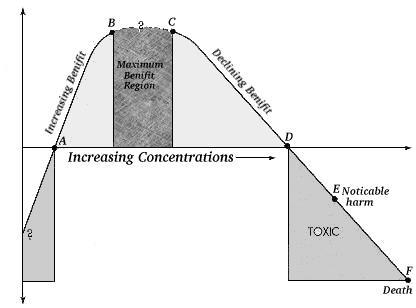Health Risks in the Environment
Health Risks in the Environment
back to Contents of Entire Course...
Cancer
Minerals, Rocks and People
adapted to HTML from lecture notes of Prof. Stephen A. Nelson Tulane University

Cancer
The following data are from the September 1996 issue of Scientic American, Special Issue on "What You Need to Know About Cancer"
Note that environmental pollution is responsible for only 2% of all fatal cancers.
Causes of Fatal Cancers
The following data have been calculated based on the information
shown in the graph on page 94 of the September 1996 issue of Scientific American
| Cause | % |
|---|---|
| Smoking | 30 |
| Diet and Obesity | 30 |
| Perinatal and Excessive Growth | 8 |
| Biological Agents | 8 |
| Occupational Factors | 8 |
| Alcohol | 3 |
| Sedentary Life Style | 3 |
| Reproductive Factors | 3 |
| Ionizing and Ultraviolet Radiation | 2 |
| Environmental Pollution | 2 |
| Inherited Genes | 2 |
| Food Additives (including Salt) | 1 |
| Medical Products and Procedures | 1 |
| Causes of Death in 1992 | Rate | |
|---|---|---|
| All Causes | 852.9 | 100.0 |
| 1. Diseases of the Heart | 281.4 | 33.0 |
| 2. Cancer | 204.1 | 23.9 |
| 3. Cerebrovascular diseases | 56.4 | 6.6 |
| 4. Chronic obstructive pulmonary diseases | 36.0 | 4.2 |
| 5. Accidents and adverse effects | 34.0 | 4.0 |
| . . . Motor vehicle accidents | 16.1 | 1.9 |
| . . . All other accidents and adverse effects | 18.0 | 2.1 |
| 6. Pneumonia and influenza | 29.7 | 3.5 |
| 7. Diabetes | 19.6 | 2.3 |
| 8. HIV | 13.2 | 1.5 |
| 9. Suicide | 12.0 | 1.4 |
| 10. Homicide and legal intervention | 10.0 | 1.2 |
| 11. Chronic liver disease | 9.9 | 1.2 |
| 12. Kidney Diseases | 8.7 | 1.0 |
| 13. Infections | 7.7 | 0.9 |
| 14. Atherosclerosis | 6.6 | 0.8 |
| 15. Birth Problems | 6.2 | 0.7 |
| . . . All other causes | 117.6 | 13. |
The following has been abstracted from the article "Strategies for Minimizing Cancer Risk" by Willett, Colditz and Mueller, September 1996 issue of Scientific American p. 88 to 99. They suggest that most types of cancer are preventable and that the "war on cancer" which has emphasized improved cancer treatment has had only limited success. The efforts of the "war on cancer" should be better balanced with more extensive efforts to reduce cancer. They suggest that about about two-thirds of cancers could be prevented. Inherited genes that cause a very high risk of getting cancer are responsible for only 2% of fatal cancers. About 30% of cancers are probably not preventable.
They recommend that to reduce your chances of getting cancer, you should:
Minerals, Rocks and People
Asbestos
- A group of minerals with high length to width ratios
- 95% of asbestos mined is chrysotile
- 5% is crocidolite and amosite
- Miners who mine chrysotile seem to have no higher rate of disease than the general public.
- People exposed to crocidolite do have a high incidence of the diseases.
- EPA makes no distinction between these two with regards to its policies.
Asbestosis
- Decreases lung efficiency.
- Is usually the result of a long-term occupational exposure to
asbestos
Mesothelemia
- Cancer of stomach and lung lining.
Black Lung
- Results from the repeated enhalation of coal dust.
Silicosis
- Results from long term inhaling of fine grained quartz.

